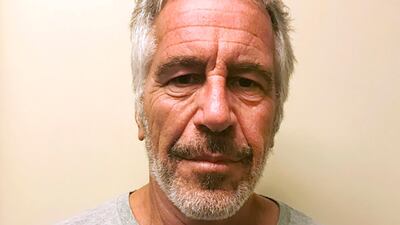Billionaire and convicted sex offender Jeffrey Epstein was found dead in his cell in the Metropolitan Correctional Centre in Lower Manhattan on Saturday morning.
Epstein, who appeared to have hanged himself, had tried to take his own life three weeks before. He was due to face trial on sex-trafficking charges.
The Manhattan US Attorney’s case against Epstein, 66, for sexual abuse of girls as young as 14 included charges of sex trafficking and sex trafficking conspiracy.
The indictment claims he “worked and conspired with others, including employees and associates who facilitated his conduct” in luring girls to his Manhattan and Palm Beach homes between 2002 and 2005.
The billionaire’s death raises questions about his links with the rich and the powerful, having been friends with US President Donald Trump, former US president Bill Clinton and Prince Andrew. All three men have denied being complicit in or knowing about Epstein's sexual offences.
There are many questions around the circumstances of Epstein’s death, considering his previous suicide attempt and that he had been on suicide watch but had been taken off.
The FBI is investigating the circumstances around his final hours and the US Attorney General William Barr said on Monday that there were “serious irregularities” around the death of the financier.
His death has fuelled conspiracy theories, as Epstein had indicated that he had compromising information on many rich and powerful people.
Mr Trump said he wanted a full investigation into the charges.
The Bureau of Prisons has only released one official statement since the billionaire’s death on Saturday.
While the statement confirmed the time Epstein was discovered in his cell, it left many questions unanswered.
Here is what we know about it so far:
The Metropolitan Correctional Centre has a reputation for high-profile prisoners and squalid conditions
Other criminals who have spent time in the prison include Mexican drug lord Joaquin “El Chapo” Guzman, who was held there until July before being transferred to a maximum-security prison in Colorado.
Also held there were Abu Anas Al Libi and Khalid Al Fawwaz, high-ranking Al Qaeda operatives who were indicted in 2000 on conspiracy charges related to the terrorist group’s 1998 bombings of two US embassies in East Africa, which killed 224 people.
The conditions in the jail are foul. In a statement released through his lawyer, Guzman said he was denied access to clean drinking water and sunlight.
Inmates have reported seeing huge rats in the jail and the plumbing of the building frequently breaks down.
Epstein was put on suicide watch for six days after his first suicide attempt and then taken off
Being on suicide watch means he would have had been moved to a minimalist cell where he would wear a tear-resistant, one-piece smock and have increased scrutiny from guards, sources told CNBC.
It was unclear why he was taken off suicide watch and so quickly, but senior prison officials, including the jail's chief psychiatrist, would have been behind the decision.
The jail was severely understaffed and officers failed to check in on Epstein several hours before he was found dead
He should have been checked regularly every 30 minutes, reports said. That left Epstein alone and unmonitored at least hours before his death.
The prison is short of staff and the Bureau of Prisons is offering a $10,000 bonus to any guard who transfers there from another federal lock-up, AP reported.
Since then, Mr Barr has lifted the hiring freeze and is trying to hire more guards.
Epstein was alone in his cell. Prisoners usually have a cellmate
It is unusual that the billionaire didn’t have a cellmate, considering his previous suicide attempt and that the prison is known for being overcrowded. It remains an unanswered question.
It is also not clear whether there were cameras in the billionaire’s cell, although legal experts say there should have been.

